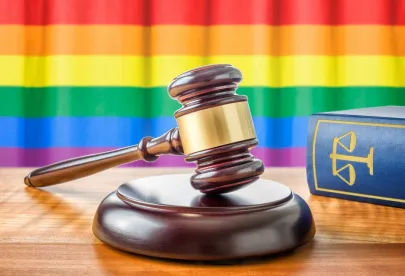On December 11, 2017, the U.S. Supreme Court refused to accept an application to appeal the court of appeals decision in Evans v. Georgia Regional Hospital, leaving unresolved a circuit split on whether federal law prohibits employment discrimination based on sexual orientation.[1]
In Evans, the plaintiff, a security officer at a Georgia hospital, claimed she had been harassed and passed over for a promotion because she was homosexual. On March 10, 2017, a divided panel of the Eleventh Circuit Court of Appeals ruled Title VII of the Civil Rights Act of 1964 does not prohibit workplace discrimination based on sexual orientation.[2] The Eleventh Circuit panel, citing Blum v. Gulf Oil Corp, noted the prior precedent rule required the court to follow circuit precedent unless overruled by the Eleventh Circuit en banc or by the Supreme Court.[3] However, the panel majority did rule Evans could bring a claim alleging she had been a victim of discrimination for failing to conform to gender stereotypes, distinguishing “sexual orientation” discrimination as legally distinct from “gender” discrimination. On July 6, 2017, the Eleventh Circuit declined to rehear the case en banc.
Meanwhile, on April 4, 2017, the Seventh Circuit reversed its position and became the first circuit court of appeals to find sexual orientation is a protected characteristic under Title VII.[4] In Hively v. Ivy Tech Community College, the Seventh Circuit, en banc, held that discrimination on the basis of sexual orientation violated Title VII.
In contrast, on April 18, 2017, in Zarda v. Altitude Express, the Second Circuit held sexual orientation is not a protected characteristic under Title VII.[5] Like the Eleventh Circuit, the Second Circuit noted that unless overruled by the Second Circuit en banc or by the Supreme Court, the court had no choice but to follow precedent. However, the Second Circuit granted rehearing en banc, specifically on the issue of whether “…Title VII of the Civil Rights Act of 1964 prohibit[s] discrimination on the basis of sexual orientation through its prohibition of discrimination ‘because of…sex.’”[6] The Second Circuit heard oral arguments on September 26, 2017, and has yet to rule.
The recent Hively opinion created a split of authority among the circuits on whether Title VII protects employees from discrimination based on sexual orientation, making the issue ripe for cert. If the Second Circuit agrees with the Seventh Circuit, the Supreme Court will face additional pressure to resolve the split.
In light of these decisions, employers, especially those with multi-state operations, should be careful to avoid discrimination on the basis of sexual orientation. Sexual orientation is now a protected characteristic in the Seventh Circuit and the Second Circuit may follow its lead. Additionally, the EEOC shared the Seventh Circuit’s view and may still bring suit against employers.[7]
Moreover, employers should be cognizant of state and local ordinances where they operate that prohibit discrimination on the basis of sexual orientation, gender identity and transgender status. Despite the current ambiguity in federal protections, it would be prudent for employers to maintain policies that prohibit discrimination against and harassment of LGBTQ employees and provide a clear mechanism for employees to report such discrimination and harassment. All complaints should be thoroughly investigated and resolved.
[1] Evans v. Ga. Reg'l Hosp., 850 F.3d 1248 (11th Cir. 2017), cert. denied (Dec. 11, 2017).
[2] Evans v. Ga. Reg'l Hosp., 850 F.3d 1248 (11th Cir. 2017).
[3] Evans v. Ga. Reg'l Hosp., 850 F.3d 1248, 1255 (11th Cir. 2017) (citing Blum v. Gulf Oil Corp., 597 F.2d 936, 938 (5th Cir. 1979)).
[4] Hively v. Ivy Tech Cmty. Coll. of Ind., 853 F.3d 339 (7th Cir. 2017).
[5] Zarda v. Altitude Express, 855 F.3d 76 (2d Cir. 2017).
[6] Zarda v. Altitude Express, Inc., No. 15-3775, 2017 U.S. App. LEXIS 13127 (2d Cir. May 25, 2017) (granting rehearing en banc).
[7] What You Should Know About EEOC and the Enforcement Protections for LGBT Workers, U.S. Equal Employment Opportunity Commission, https://www.eeoc.gov/eeoc/newsroom/wysk/enforcement_protections_lgbt_workers.cfm (last visited Dec 11, 2017).




 />i
/>i

